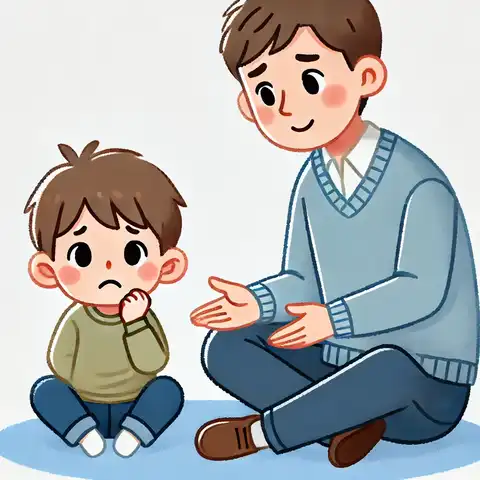Gentle parenting is a particular way of raising children that employs practices like being gentle (= kind) and patient. It is taught not by punishments but by respect and civility of communication.
Gentle parenting has advantages, but it can also have disadvantages. In the following paragraphs, we discuss some common pitfalls in gentle parenting and how to address them.
What is gentle parenting?
Instead, gentle parenting emphasises empathy, respect, and teaching rather than punishment.
Common Problems with Gentle Parenting

So here are 10 Issues with Gentle Parenting as a Philosophy.
1. Setting Clear Boundaries
One problem with gentle parenting is that some rules must draw the line farther down to keep everyone safe. These perceptual abilities are also necessary to set boundaries for children who may not know the difference between right and wrong. Without guidelines, a person might get the wrong impression of how he or she should act. Kids might believe that they can do anything, so it is important to have certain rules.
Solution: This is simply establishing rules and enforcing them. Inform your child which behaviours will not fly. When you speak to them, maintain a calm but firm attitude.
2. Time-Consuming
This type of decision-making certainly is not quick and easy when you choose the gentle parenting path. It often involves teaching and problem-solving with children (and patience comes into play here as well!)… This might be difficult for busy parents to do for every single issue.
Solution: You can skip long talks all the time. A simple and direct order can also help. Reserve more in-depth conversations for more significant matters.
3. A Sense That Kids Look to Parents Too Much
The other problem is that gentle parenting can render children even more dependent. However, if you solve every problem for kids all the time, it makes them unable to think independently.
Address: Encourage your child to make small, independent decisions. Make them do things by themselves so they can develop the ability.
4. Discipline Can Be Tricky
This is often a struggle for parents new to gentle parenting because they don’t discipline (think punishment) their children and are unsure how to manage bad behaviour. Kids have no reason to discontinue their behavior if we do not provide some consequences (as does life).
Answer: Natural Consequences Thus, if your child does not clean up their toys, they might not play with them later. This way, they are penalised for their actions simply by learning from this.
5. Perceived as too lenient
A common misconception about gentle parenting is that it means having no boundaries and letting your child do whatever they want. This is not true. Gentle parenting still has boundaries and limits, but how it solves problems is different from the traditional method.
Solution: To those who do not understand, gentle parenting is called for a good reason; you explain to them that gentle means we TEACH and NOT PUNISH. You can demonstrate how to teach your child and correct behavior without using a harsh tone.
6. Emotional Burnout for Parents
Everything about respectful parenting is emotionally taxing. Keeping calm and handling your child’s feelings 24/7 can be exhausting. The parents may have reached their limit after working so hard to be patient in those challenging moments.
Resolution: Also, look out for yourself. If you feel overwhelmed, rest. Recharge yourself so you can parent with love.
7. This is Not for Every Kid
Gentle parent: It may not be well received by all kids. Other children may need even more direct consequences and stricter guidelines so that there is no room for misunderstanding what is expected of them. Strong-willed children, especially, are going to test the limits and make it difficult to better control them.
Problem: You are not tailoring your approach to what works best for the [] child. Solution: Adapt the technique to your child’s temperament instead. Clearly, some children may need more structure and guidance than others, while others can do well with a gentle foundation.
8. Facing Criticism from Others
A lot of gentle parents face opposition from the outside. Your friends and family might think you are too soft. This is hard to do, especially when you are trying to look out for your child.
Answer: Have faith in your decisions. Every family is different; just keep this in mind. The most important thing is that your child is learning and flourishing.
9. Requires Lots of Patience
Gentle parenting takes time and patience, significantly when changing behaviour with our children. Parents keen to observe rapid improvements on your behalf might also feel frustrated.
Resolution: Just give it time and patience. Slow down if you must, but keep on learning. Slow and steady wins the race; remember, a setback is not about to end you. Celebrate small victories, and stay consistent with your efforts.
10. Struggle to follow the rules once they are not in the house
Children growing up in the gentle parenting way might not be able to follow strict rules in a few other places like schools. For example, they might need to become more familiar with an environment where things are more structured and there is less room to go off script.
Problem: Do not conform Solution: Different places, different rules (onderscheid tussen huis en daarbuiten). Explain that home means no rules, but at other schools, there are certain things they need to be mindful of.
What are the Pros of Gentle Parenting?

It affects both children and parents with numerous sound effects. Here are the main benefits:
- A closer bond with your child: When you are kind and listen, your kid will trust you.
- Improved Emotional Skills: It teaches kids how to deal with emotions.
- Increases self-confidence: children can feel valued when handled with respect.
- Encourages Problem-Solving: This is the phase when kids understand how to think through problems and solutions.
- Promotes Compassion: Whatever you do, the children will copy. They also develop respect for other individuals and learn how to cooperate with others.
Teaches Kids How To Behave Instead Of Punish ~ A Reputation For Fewer Behavior Problems When rules make sense to kids, they are less likely to misbehave.
- Serenity Home: It is peaceful, with no shouting or foul language. This reduces stress for everybody, as the kids feel safe expressing their thoughts.
- Develop independence: Kids become better at decision-making. This makes them feel more independent, which in turn helps them gain independence over time.
- Helps in Social Skills: Children exposed to this usually develop better friendships. They learn how to listen, be empathetic and communicate kindly.
- Long-term positive outcomes: Children who grow up to be competent and caring adults!
So they spend years and months learning this spoiling, which makes them a little more confident, generous, and kind human beings.
What are the underlying principles of gentle parenting?

The show emphasises the four following themes:
- Empathy: View the world from your child’s perspective and treat them tenderly.
- Respect: Parents treat their kids with values that they also follow.
- Insight: Parents replace punishment with understanding why their child expresses themselves this way.
- Communication: Parents communicate rules and reasoning and listen to their children.
This thinking environment nurtures children this way.
So, What are the Limitations of Gentle Parenting?
It has some challenges:
- Time-Consuming: Parents who are always busy find it more time-consuming as they have to talk and resolve queries.
- Rules Not Being Clear: Children never know what to expect when parents are not assertive.
- Parent Burnout: It is tiring for parents always to be calm and patient.
- Dependency: If children are always directed by their parents, they may depend on them excessively instead of being independent.
What Are the Drawbacks of Gentle Parenting?

- Discipline Issues: Some parents worry that they don’t know how to manage misbehaviour without punishing it.
- Not Suitable for All Children: Some are in a race, others need more structure or firmer rules.
- Children raised with gentle parenting will struggle to follow stricter rules in other settings, such as schools.
It brings them closer but is only possible to maintain with defining Thrones and balancing both sides.
FAQs
To Be Too Weak, Or Not?
So, gentle parenting does not mean having a free-for-all with your children. It simply forgoes draconian penalties.
Is Gentle Parenting Spoiling?
That’s right, your child will not be spoilt if you are a gentle parent.
Does It work for every child?
False, some children might respond to a stricter approach with harsher consequences.
What do I do if people make fun of It?
Keep firm in your parenting decisions and let them know gentle discipline is about learning, not punishment.
How do I draw a line in the sand with It?
Have a clear set of rules and let your child learn from their actions with natural consequences.
Does It take more time?
That is correct; teaching and explaining through conversations is more time-consuming. Will this approach work with strong-willed kids?
Yes, but you require lat-explicit directions for having stubborn kids.
While gentle parenting is a very nurturing approach to child rearing, it presents numerous challenges, including boundaries, independence, and criticism.
Does this sound familiar? This would allow your child to develop in a good atmosphere. Moreover, enduring and embracing the drop is another extremely important feature that you should also make possible for your own children.


